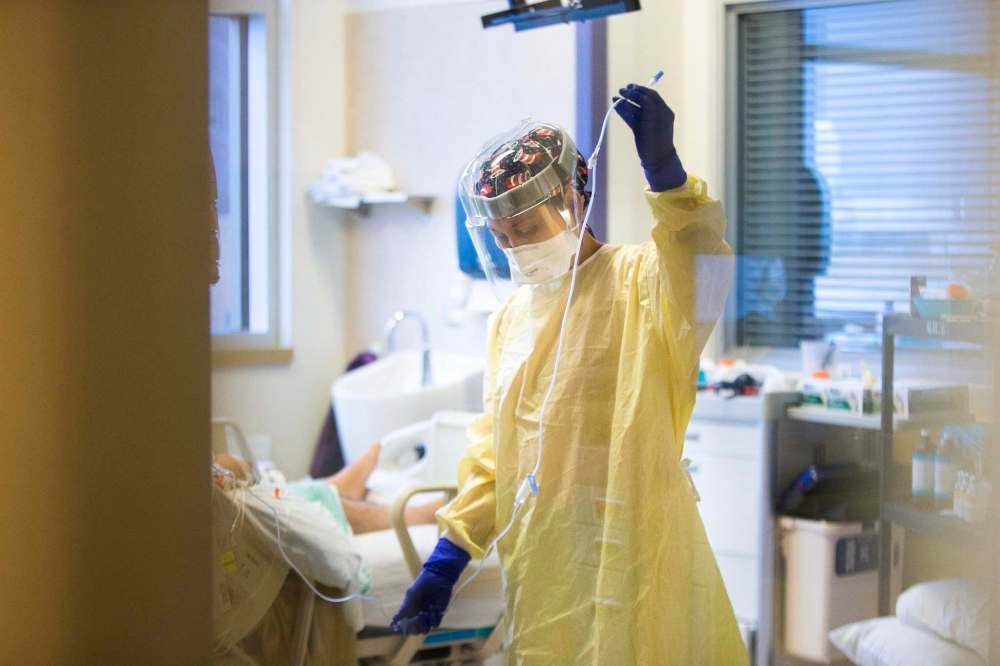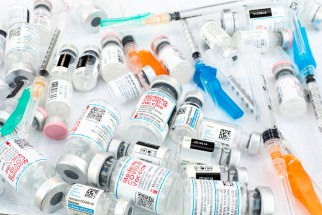Get the shots, stay out of ICU
Read this article for free:
or
Already have an account? Log in here »
To continue reading, please subscribe:
Monthly Digital Subscription
$0 for the first 4 weeks*
- Enjoy unlimited reading on winnipegfreepress.com
- Read the E-Edition, our digital replica newspaper
- Access News Break, our award-winning app
- Play interactive puzzles
*No charge for 4 weeks then price increases to the regular rate of $19.00 plus GST every four weeks. Offer available to new and qualified returning subscribers only. Cancel any time.
Monthly Digital Subscription
$4.75/week*
- Enjoy unlimited reading on winnipegfreepress.com
- Read the E-Edition, our digital replica newspaper
- Access News Break, our award-winning app
- Play interactive puzzles
*Billed as $19 plus GST every four weeks. Cancel any time.
To continue reading, please subscribe:
Add Free Press access to your Brandon Sun subscription for only an additional
$1 for the first 4 weeks*
*Your next subscription payment will increase by $1.00 and you will be charged $16.99 plus GST for four weeks. After four weeks, your payment will increase to $23.99 plus GST every four weeks.
Read unlimited articles for free today:
or
Already have an account? Log in here »
Hey there, time traveller!
This article was published 16/06/2021 (1635 days ago), so information in it may no longer be current.
If there were any doubts about the safety and effectiveness of COVID-19 vaccines, hospital admission data released by the province last week should put it to rest.
Clinical trials, real-world data and followup studies from around the globe have for months provided public health officials with strong evidence of the vaccines’ efficacy.
However, there is nothing like data from one’s own backyard to help convince the vaccine hesitant that getting fully immunized could keep them and their loved ones out of hospital.
According to deputy chief provincial public health officer Dr. Jazz Atwal, of the dozens of patients admitted to intensive care units in the first week of June, none was fully vaccinated. Among those sick enough to be admitted to a hospital bed (but not an ICU), 80 per cent had not received any vaccine, or it had been less than two weeks since they received their first shot. Only 2.6 per cent of patients admitted to a non-ICU bed had both vaccine doses.

These statistics are not surprising. They are consistent with data from around the world. However, timely and reliable data from a local source is a powerful reaffirmation of how well immunization prevents people from becoming severely ill with COVID-19.
“We’re not seeing really any Manitobans that are vaccinated and protected being admitted to ICU,” Dr. Brent Roussin, the chief provincial public health officer, reiterated Monday.
The point of highlighting the effectiveness of the vaccine is not to blame people in the ICU for not getting the shot, as Premier Brian Pallister did last month.
Mr. Pallister suggested many people in the ICU were there because they chose not to get immunized. In fact, many people below the age of 50 were not eligible for the vaccine at the time he made the claim. Some were unable to get immunized for legitimate reasons. Shaming and blaming is not an effective strategy to improve vaccine take-up; accurate, persuasive information, such as last week’s hospital admissions data, is.
For Manitobans still uncertain about the safety or efficacy of the vaccine, last week’s hospital data provides strong evidence that the best way to avoid a stay in an intensive care unit is to get fully immunized.
The vast majority of Manitobans have not received their second dose yet, mostly because they have not been eligible. Provincial officials say demand for second doses is strong and the percentage of people signing up for appointments continues to grow. With more supply of the Moderna vaccine announced by the federal government last week, second-dose bookings are expected to accelerate.
About 70 per cent of Manitobans over the age of 12 have received at least one dose. However, there are legitimate reasons why some have still not been vaccinated. Some elderly people and others with mobility issues can’t leave their homes to travel to a super site, a clinic or a pharmacy. There is still no home-based vaccine service for them. Others face social and economic barriers that make it difficult to access health care services. The province has been slow to respond to those realities. Public health officials should make access more inclusive, including expanding walk-up service and providing greater supports where needed.
For Manitobans still uncertain about the safety or efficacy of the vaccine, last week’s hospital data provides strong evidence that the best way to avoid a stay in an intensive care unit is to get fully immunized.
The province should release similar data on a regular basis to encourage more people to get the shot.




.jpg?h=215)


1.jpg?h=215)